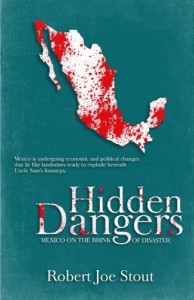As has been raised many times before, Who’s to blame? The one who consumes or the one who sells? Be it slavery, alcohol, or narcotic drugs. Is it the criminal selling the drugs or the people consuming these drugs which make the illegal trade possible.
Well, it might be difficult to eradicate production and supply of drugs in a foreign country. But it is possible to levy huge fines and impose harsh punishment on those who use these for recreation. The trade will surely die when there is no market and demand?
But that is the beauty of illegal trade. Everyone in the supply chain profits when the trade is illegal. Perhaps this is one of the reasons to keep it that way.
As for drugs so is for illegal immigration. You say Mexico, people immediately say illegal immigration. But the fact is these people are there in the US because someone is hiring illegal workers. All these long debates would be unnecessary if there was indeed a consensus on not allowing illegal immigrants and not hiring them.
While illegal immigration might cause some uncomfortable moments in the US during elections and and large-scale job cuts, it has thrown Mexico into an economic abyss that has become a time-bomb poised to explode.
In Hidden Dangers, Joe Stout looks at the illegal drug trade and immigration problem from the point of view of the people from the south of the American border.
Journalist and novelist Robert Joe Stout has written extensively about Mexico and Mexico-United States relationships. Reports and analyses appeared in The American Scholar, America, Commonweal, Monthly Review and New Politics among many other publications. A graduate of Mexico’s Universidad de las Americas his publications include three novels, two volumes of poetry and hundreds of literary and commercial magazine essays, articles and short stories.
 Hidden Dangers: Mexico on the Brink of Disaster
Hidden Dangers: Mexico on the Brink of Disaster
Author: Robert Joe Stout Pages: 216 Publisher: Sunbury Press, Inc. (September 19, 2014) ISBN: 162006488X, 978-1620064887
Mexico and the US are intricately connected and have survived for a long time with help from each other. Mexico has benefited a lot from the remuneration sent by the immigrants to the US and the US agriculture and other labor intensive industries with the much needed labor supply from Mexico.
However, this exchange of people soon increased to a level where Mexico was robbed of a fit, working population. People stopped working in the farms for more money and better life in the US and the families that stayed behind began living on the remuneration sent by those moving to the US.
The increasing demand of narcotic drugs in the US for recreational purposes further complicated the situation and life of Mexicans. We have seen many movies that show the brutality of the cartels and the heroic rescue by the US forces. But the author shows us various hardships that Mexican citizens have to endure day to day and hour to hour to fill the insatiable demand of drugs in the US.
Pushed by the cartels, harassed by the government forces, and sold out to any of these by local leaders, the state of governance has made Mexico a minefield for the citizens.
Hidden Dangers points out that the situation is much more complex than just fixing one problem: illegal immigration or drugs. The author stresses this repeatedly throughout the book as he explores each axis and its repercussions on the civilian life in Mexico.
He apprises the reader of the dire situation which is poised to explode. He looks at the history and examines various economic policies of the US and the bilateral agreements that have backfired and complicated the situation further. The free flow of guns and arms into Mexico from the US gives this whole struggle an additional violent strain.
All of these myriad problems are interconnected and form a complex web. You pull one string, and the entire web feels the strain. Illegal immigration, drug trade, and threat from the cartels all exist. The question is how long can you treat the symptoms in an Ad hoc manner without really looking for a cure. Hidden Dangers is call to authorities and leaders on both sides of the border to sit up and take notice of the worsening situation. A call to make Mexico self-sufficient and eradicate the parallel economy of drug trade.